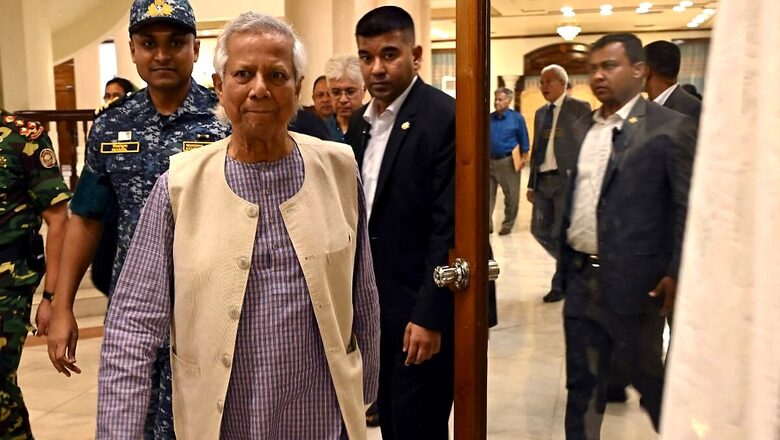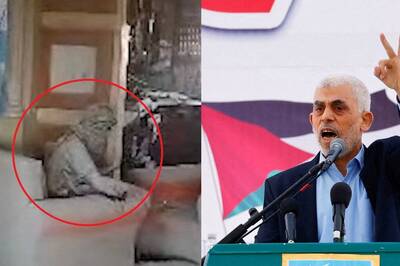
views
Since the resignation of long-serving Bangladeshi Prime Minister Sheikh Hasina on August 5 this year, the nation has been navigating a period of political transition. As Bangladesh prepares for a new chapter, an interim government led by Nobel laureate Muhammad Yunus is struggling to handle a volatile situation. India, which has traditionally enjoyed a cordial relationship with Hasina, is closely monitoring the unfolding events in its neighbouring country with a mix of caution and apprehension. Amidst this complex scenario, the recent visit of China’s Ambassador to Dhaka, Yao Wen, to the central office of Jamaat-e-Islami Bangladesh in Moghbazar, Dhaka, has added a layer of complexity to the already delicate situation. This development has the potential to further shape the trajectory of Bangladesh’s political landscape as it navigates the challenges and opportunities presented by the transition.
This visit signifies the first occasion since 2010 that a foreign diplomat has engaged with the Jamaat’s office, which had been closed until the recent collapse of the Hasina administration. Ambassador Yao Wen met with Jamaat’s Amir, Dr Shafiqur Rahman, and allegedly conveyed a desire for enhanced cooperation between China and the Jamaat. Following their discussion, the ambassador commended the Jamaat as a “well-organised political party”, while the Amir acknowledged China’s significant contributions to Bangladesh’s economic and social development. He also urged China to adopt a more proactive stance regarding the Rohingya refugee crisis. Additionally, the Amir reiterated his support for the One-China principle.
The Jamaat-e-Islami, the largest Islamist political party in Bangladesh, played a crucial role in the student-led protests that resulted in the ousting of a government increasingly unpopular due to its authoritarian practices and economic decline, particularly exacerbated by the Covid-19 pandemic. Despite having opposed Bangladesh’s independence in 1971 and facing legal repercussions for war crimes during the liberation conflict, the party has managed to establish a significant presence among the populace over the past decade, particularly within university circles. Its student faction, Islami Chhatra Shibir (ICS), is reported to have strong connections with Pakistan’s Inter-Services Intelligence (ISI) and received financial support from this agency earlier this year to facilitate anti-establishment activities.
Originating from a movement for Islamic revival in British India under Maulana Abul A’ala Maududi in 1941, Jamaat-e-Islami has historically adhered to a fundamentalist ideology aimed at implementing Sharia law as a governing framework. Due to its collaboration with the Pakistani establishment during the liberation war and its continued opposition to India, it has maintained a consistently anti-India stance. The party is anticipated to perform well in upcoming elections, and China’s recent engagement with Jamaat-e-Islami reinforces its potential significance in Bangladesh’s political future.
China has significant interests in Bangladesh, particularly through its infrastructure initiatives related to the Belt and Road Initiative (BRI). Conversely, India, which shares a border exceeding 4,000 km with Bangladesh—the fifth-longest land border globally—has crucial economic interests linked to trade and various investments made over the years, alongside essential security concerns that necessitate a supportive government. For example, former Prime Minister Sheikh Hasina collaborated with India by extraditing numerous leaders of insurgent groups from Northeast India who had sought refuge in Bangladesh and implemented strict measures to prevent the country from being used for anti-India terrorist activities.
This cooperation dates back to Bangladesh’s independence when India aided Sheikh Mujibur Rahman, Hasina’s father, in establishing the nation. However, as Bangladesh increasingly depends on Chinese loans and investments to meet its economic needs, Hasina has been perceived as attempting to navigate a delicate balance between these two powers. This balancing act was highlighted when she attended Prime Minister Narendra Modi’s swearing-in on June 9 and subsequently visited China within a month. Nevertheless, China’s displeasure with this approach became apparent during her visit, which was marked by diplomatic discourtesy that forced her to shorten her trip.
Furthermore, China reneged on its commitment to provide $5 billion in loans to Bangladesh, ultimately offering only approximately $100 million. India’s strategic success in securing operational rights to a terminal at Mongla Port—Bangladesh’s second-largest seaport—also posed a challenge to China’s maritime ambitions in the region. Some reports even suggested that China has been covertly working towards destabilising Hasina’s government.
It seems that China is aligning itself with Jamaat-e-Islami Bangladesh, particularly in light of the party’s contentious stance towards India. Recently, Jamaat’s Chief, Shafiqur Rahman, expressed a desire for improved relations with India, stating, “Neighbours cannot be changed at will.” However, he qualified this by insisting that India’s foreign policy should not interfere in Bangladesh’s internal matters, noting that past actions by New Delhi have not been well received by the Bangladeshi populace. This sentiment underscores the mistrust that Jamaat harbours towards India.
From this perspective, India risks losing significant geopolitical influence in Bangladesh if it does not navigate the situation carefully, especially if Jamaat gains power. The response of strategists and diplomats in New Delhi to China’s overtures towards Jamaat-e-Islami will be crucial in determining future relations and stability in the region.
The writer is an author and columnist and has written several books. His X handle is @ArunAnandLive. Views expressed in the above piece are personal and solely those of the author. They do not necessarily reflect News18’s views.




















Comments
0 comment